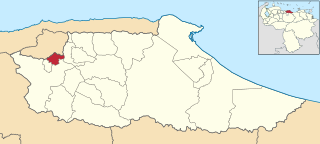
The Spanish National Research Council is the largest public institution dedicated to research in Spain and the third largest in Europe. Its main objective is to develop and promote research that will help bring about scientific and technological progress, and it is prepared to collaborate with Spanish and foreign entities in order to achieve this aim.
Alimentos Polar, C.A. is an Empresas Polar subsidiary that operates in the foods and drinks area, manufacturing and sending deliveries to its clients.

Los Salias, founded in 1982, is one of the 21 municipalities (municipios) that makes up the Venezuelan state of Miranda and, according to a 2011 population estimate by the National Institute of Statistics of Venezuela, the municipality has a population of 68000. It's located approximately 14 km away from Caracas and it borders with the Capital District to the north, Guaicaipuro Municipality to the south, Baruta to the east and Carrizal to the west. Los Salias has an Area of 51 km2 and a max altitude of 1700 metres above sea level. The town of San Antonio de Los Altos is the municipal seat of Los Salias.

The Morán Municipality is one of the nine municipalities (municipios) that makes up the Venezuelan state of Lara and, according to a 2007 population estimate by the National Institute of Statistics of Venezuela, the municipality has a population of 128,674. The town of El Tocuyo is the shire town of the Morán Municipality.

The Institute of Astrophysics of Andalusia is a research institute funded by the High Council of Scientific Research of the Spanish government Consejo Superior de Investigaciones Científicas (CSIC), and is located in Granada, Andalusia, Spain. IAA activities are related to research in the field of astrophysics, and instrument development both for ground-based telescopes and for space missions. Scientific research at the Institute covers the Solar System, star formation, stellar structure and evolution, galaxy formation and evolution and cosmology. The IAA was created as a CSIC research institute in July 1975. Presently, the IAA operates the Sierra Nevada Observatory, and the Calar Alto Observatory.
Latindex is a bibliographical information system available for free consultation. Established as a network in 1997, the project is based on the cooperation of 17 national resource centers that operate in a coordinated scheme for the gathering and dissemination of relevant information and data on the Iberoamerican journals.

The TELMAG is an ongoing research project which was born in the Instituto Venezolano de Investigaciones Científicas (IVIC) in 1967, and later continued by the Universidad de Los Andes, Venezuela. The TELMAG is a ground mass transport system that does not require mechanical friction for drive and guidance as conventional trains do.
Ivić or Ivic is a South Slavic surname and a masculine given name. It may refer to:

Science and technology in Venezuela includes research based on exploring Venezuela's diverse ecology and the lives of its indigenous peoples.
Francisco Antonio De Venanzi was a Venezuelan doctor, scientist and academic. He was rector of the Universidad Central de Venezuela from 1959 to 1963. His biography was published as volume 51 of the Biblioteca Biográfica Venezolana.

The Lorenzo Mendoza Fleury Science Prize, also known as the "Premio Fundación Empresas Polar" is the most important award offered by the private sector to contemporary scientists from Venezuela who have shown outstanding talent, creativity and productivity during a given period.

José Maria Cruxent was a professional archaeologist considered to be the "Father of Scientific Archaeology" in Venezuela. He was born in Barcelona, Catalonia, Spain. Cruxent is known for making significant contributions to understanding the cultural history of Venezuela from the Paleoindian period to the early Colonial period.
Roze's gecko, also known commonly as limpiacasa, is a species of lizard in the family Sphaerodactylidae. The species is endemic to Venezuela.

The RV-1 nuclear reactor, now repurposed and known as Gamma rays sterilization plant, is a facility located in Altos Mirandinos, Miranda, Venezuela. It was the only nuclear reactor in Venezuela and one of the first reactors in Latin America. Currently, it is used as a gamma ray facility for microbiological sterilization of surgical supplies, packaging, medicine and dry food.
Elvira Cuevas Viera is a Puerto Rican ecologist. She is a professor in the department of biology at University of Puerto Rico, Río Piedras Campus where she serves as director of the Center for Applied Tropical Ecology and Conservation.

The Oceanographic Institute of Venezuela is an academic and research institution within the Universidad de Oriente which specializes in applied research and teaching in the fields of marine biology, oceanography and fisheries science.
Jenara Vicenta Arnal Yarza, was the first woman to hold a Ph.D. in Chemistry in Spain. She was noted for her work in electrochemistry and her research into the formation of fluorine from potassium biflouride. In later years, she was recognized for her contribution to the pedagogy of teaching science on the elementary and secondary levels, with a focus on the practical uses of chemistry in daily life. She was awarded a national honor, the Orden Civil de Alfonso X el Sabio.
Eumelia Hernández was a Venezuelan feminist activist, and unionist. She was a founding member of the Feminine Cultural Association and the Vice President of the Central Unitary of Workers of Venezuela.
IVIC syndrome, also known as Instituto Venezolano de Investigaciónes Científicas syndrome or oculo-oto-radial syndrome is a very rare autosomal dominant limb malformation genetic disorder that is characterized by upper limb and ocular abnormalities and congenital hearing loss on both ears.
Sergio Arias Cazorla is a human geneticist who worked as a geneticist in the Venezuelan Institute for Scientific Research.










